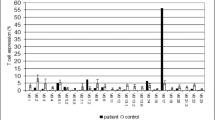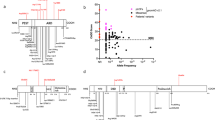Abstract
Purpose
Artemis is an exonuclease essential for V(D)J recombination and repair of DNA double-stranded breaks. Pathogenic variants in DCLRE1C encoding Artemis cause T−B−NK+ severe combined immunodeficiency (SCID), and patients with Artemis-deficient SCID (ART-SCID) require definitive therapy with allogeneic hematopoietic cell transplantation (HCT). Here we describe the clinical and genetic characteristics of patients with ART-SCID who were diagnosed in Japan from 2003 to 2022.
Methods
Clinical data of ART-SCID patients who were diagnosed between 2003 and 2022 in Japan were collected from their physicians using a questionnaire.
Results
ART-SCID diagnosis was made in eight patients from seven families with severe infections within 6 months of life. Two patients had missense variants, five patients had large genomic deletions, and one patient was compound heterozygous for a missense variant and large genomic deletion. All eight underwent allogeneic HCT within 4 months after the diagnosis, 7 receiving a conditioning regimen containing alkylating agents, and one patient without conditioning due to uncontrolled infection. Two patients with poor performance status (PS) died of complications 410 days and 32 days post-HCT, respectively. Of the six surviving patients with a median follow-up time of 8.3 (0.5–17.9) years, three patients had growth retardation. The patients with PS of 0–2 showed a tendency for better overall survival than those with PS 3–4.
Conclusion
Large deletions were the most common genetic cause of ART-SCID in Japan. To improve HCT outcome, early diagnosis with newborn screening for SCID is urgently needed.



Similar content being viewed by others
Data Availability
The datasets for this article are not publicly available due to concerns regarding participant/patient anonymity. Requests to access the datasets should be directed to the corresponding author.
Abbreviations
- AUC:
-
Area under the curve
- CBT:
-
Cord blood transplantation
- FISH:
-
Fluorescence in situ hybridization
- GVHD:
-
Graft-versus-host disease
- HCT:
-
Hematopoietic cell transplantation
- HLH:
-
Hemophagocytic lymphohistiocytosis
- KRECs:
-
Kappa-deleting recombination excision circles
- LA:
-
Long and accurate
- MLPA:
-
Multiplex ligation-dependent probe amplification
- NBS:
-
Newborn screening
- PjP:
-
Pneumocystis jirovecii Pneumonia
- PS:
-
Performance status
- SCID:
-
Severe combined immunodeficiency
- SNP:
-
Single-nucleotide polymorphism
- TRECs:
-
T-cell receptor excision circles
References
Miyamoto S, Umeda K, Kurata M, Nishimura A, Yanagimachi M, Ishimura M, et al. Hematopoietic cell transplantation for severe combined immunodeficiency patients: a Japanese retrospective study. J Clin Immunol. 2021;41:1865–77.
Kwan A, Abraham RS, Currier R, Brower A, Andruszewski K, Abbott JK, et al. Newborn screening for severe combined immunodeficiency in 11 screening programs in the United States. JAMA. 2014;312:729–38.
Amatuni GS, Currier RJ, Church JA, Bishop T, Grimbacher E, Nguyen AA, et al. Newborn screening for severe combined immunodeficiency and T-cell Lymphopenia in California, 2010–2017. Pediatrics. 2019;143:e20182300.
Tangye SG, Al-Herz W, Bousfiha A, Cunningham-Rundles C, Franco JL, Holland SM, et al. Human inborn errors of immunity: 2022 Update on the Classification from the International Union of Immunological Societies Expert Committee. J Clin Immunol. 2022. https://doi.org/10.1007/s10875-022-01289-3.
Moshous D, Callebaut I, de Chasseval R, Corneo B, Cavazzana-Calvo M, Le Deist F, et al. Artemis, a novel DNA double-strand break repair/V(D)J recombination protein, is mutated in human severe combined immune deficiency. Cell. 2001;105:177–86.
van Zelm MC, Geertsema C, Nieuwenhuis N, de Ridder D, Conley ME, Schiff C, et al. Gross deletions involving IGHM, BTK, or Artemis: a model for genomic lesions mediated by transposable elements. Am J Hum Genet. 2008;82:320–32.
Pannicke U, Hönig M, Schulze I, Rohr J, Heinz GA, Braun S, et al. The most frequent DCLRE1C (ARTEMIS) mutations are based on homologous recombination events. Hum Mutat. 2010;31:197–207.
Kwan A, Hu D, Song M, Gomes H, Brown DR, Bourque T, et al. Successful newborn screening for SCID in the Navajo Nation. Clin Immunol. 2015;158:29–34.
Tomizawa D, Miyamura T, Imamura T, Watanabe T, Moriya Saito A, Ogawa A, et al. A risk-stratified therapy for infants with acute lymphoblastic leukemia: a report from the JPLSG MLL-10 trial. Blood. 2020;136:1813–23.
Okano T, Tsujita Y, Kanegane H, Mitsui-Sekinaka K, Tanita K, Miyamoto S, et al. Droplet digital PCR-based chimerism analysis for primary immunodeficiency diseases. J Clin Immunol. 2018;38:300–6.
Yosaatmadja Y, Baddock HT, Newman JA, Bielinski M, Gavard AE, Mukhopadhyay SMM, et al. Structural and mechanistic insights into the Artemis endonuclease and strategies for its inhibition. Nucleic Acids Res. 2021;49:9310–26.
Hayase T, Ikeda T, Yoshimoto T, Imai K, Morimoto A. Fatal idiopathic pneumonia syndrome in Artemis deficiency. Pediatr Int. 2019;61:929–31.
Hiramoto R, Osone S, Imamura T, Ishida H, Takashima T, Imai K, et al. Successful cord blood transplantation in a case of severe combined immunodeficiency with cytomegalovirus infection. Japan J Pediatr Hematol/Oncol. 2015;52:449–53 [in Japanese].
Tomomasa D, Isoda T, Mitsuiki N, Inoue K, Nishimura A, Uda K, et al. Successful TCRαβ/CD19-depleted hematopoietic cell transplantation for a patient with Artemis deficiency. J Pediatr Hematol/Oncol (in press).
Ng PC, Henikoff S. SIFT: Predicting amino acid changes that affect protein function. Nucleic Acids Res. 2003;31:3812–4.
Adzhubei IA, Schmidt S, Peshkin L, Ramensky VE, Gerasimova A, Bork P, et al. A method and server for predicting damaging missense mutations. Nat Methods. 2010;7:248–9.
Kircher M, Witten DM, Jain P, O’Roak BJ, Cooper GM, Shendure J. A general framework for estimating the relative pathogenicity of human genetic variants. Nat Genet. 2014;46:310–5.
Pai SY, Logan BR, Griffith LM, et al. Transplantation outcomes for severe combined immunodeficiency, 2000–2009. N Engl J Med. 2014;371:434–46.
Haddad E, Logan BR, Griffith LM, Buckley RH, Parrott RE, Prockop SE, et al. SCID genotype and 6-month posttransplant CD4 count predict survival and immune recovery. Blood. 2018;132:1737–49.
Dorsey MJ, Weight NAM, Chaimowitx NS, Dávila Saldaña BJ, Miller H, Keller MD, et al. Infections in infants with SCID: isolation, infection screening, and prophylaxis in PIDTC centers. J Clin Immunol. 2021;41:38–50.
Wakamatsu M, Kojima D, Muramatsu H, Okuno Y, Kataoka S, Nakamura F, et al. TREC/KREC newborn screening followed by next-generation sequencing for severe combined immunodeficiency in Japan. J Clin Immunol. 2022 Jul 28.
Schuetz C, Neven B, Dvorak CC, Leroy S, Ege MJ, Pannicke U, et al. SCID patients with ARTEMIS vs RAG deficiencies following HCT: increased risk of late toxicity in ARTEMIS-deficient SCID. Blood. 2014;123:281–9.
Nishimura A, Aoki Y, Ishiwata Y, Ichimura T, Ueyama J, Kawahara Y, et al. Hematopoietic cell transplantation with reduced intensity conditioning using fludarabine/busulfan or fludarabine/melphalan for primary immunodeficiency diseases. J Clin Immunol. 2021;41:944–57.
Punwani D, Kawahara M, Yu J, Sanford U, Roy S, Patel K, et al. Lentivirus mediated correction of Artemis-deficient severe combined immunodeficiency. Hum Gene Ther. 2017;28:112–24.
Mornet E, Crété P, Kuttenn F, Raux-Demay MC, Boué J, White PC, et al. Distribution of deletions and seven point mutations on CYP21B genes in three clinical forms of steroid 21-hydroxylase deficiency. Am J Hum Genet. 1991;48:79–88.
Kobayashi N, Agematsu K, Sugita K, Sako M, Nonoyama S, Yachie A, et al. Novel Artemis gene mutations of radiosensitive severe combined immunodeficiency in Japanese families. Hum Genet. 2003;112:348–52.
Acknowledgements
We thank the patients and their parents to participate in this study. We also thank Naomi Terada, Maki Yamazaki, Yin Yi, Keiko Obata, and Yasuyoshi Ishiwata for their technical assistance. We are grateful to Dr. Hideki Muramatsu and Masataka Ishimura for giving us the data of NBS.
Funding
This work was supported by MEXT/JSPS KAKENHI (Grant Number: 22K07887) to HK.
Author information
Authors and Affiliations
Contributions
KeI performed genetic analysis, analyzed the data, and wrote the manuscript. S. M. analyzed the data. D. T. performed genetic analysis and provided the patient data. E. A., O. O., and M. CvZ performed genetic analysis. S. A., Y. H., T. I., S. O., Y. O., and KoK provided the patient data. Z. K. and H. O. performed structural analysis. KeK, KoI, M. J. C., and T. M. provided critical discussion. H. K. conceptualized the study and edited the manuscript. All authors read and approved the final manuscript.
Corresponding author
Ethics declarations
Ethics Approval
Informed consent was obtained from their parents. This study was conducted in accordance with the Helsinki Declaration and approved by the ethics boards of the Tokyo Medical and Dental University.
Consent to Participate
Informed consent was obtained from all patients and their parents included in this study.
Consent for Publication
Informed consent was obtained from all participants included in this study.
Conflict of Interest
All the authors declare that they have no relevant conflict of interest.
Additional information
Publisher's Note
Springer Nature remains neutral with regard to jurisdictional claims in published maps and institutional affiliations.
Supplementary Information
Below is the link to the electronic supplementary material.
Rights and permissions
Springer Nature or its licensor (e.g. a society or other partner) holds exclusive rights to this article under a publishing agreement with the author(s) or other rightsholder(s); author self-archiving of the accepted manuscript version of this article is solely governed by the terms of such publishing agreement and applicable law.
About this article
Cite this article
Inoue, K., Miyamoto, S., Tomomasa, D. et al. Clinical and Genetic Characterization of Patients with Artemis Deficiency in Japan. J Clin Immunol 43, 585–594 (2023). https://doi.org/10.1007/s10875-022-01405-3
Received:
Accepted:
Published:
Issue Date:
DOI: https://doi.org/10.1007/s10875-022-01405-3




